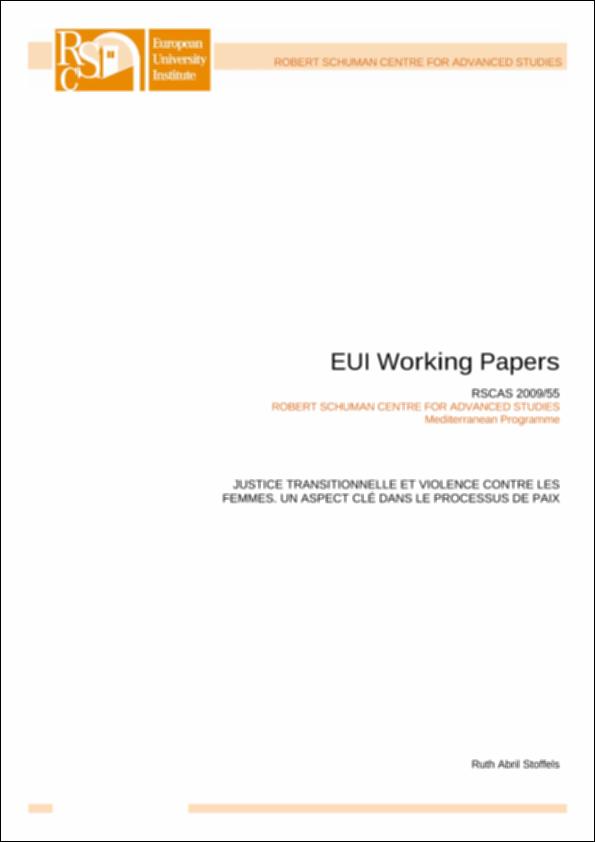Please use this identifier to cite or link to this item:
http://hdl.handle.net/10637/7156Justice transitionnelle et violence contre les femmes : un aspect clé dans le processus de paix
| Title: | Justice transitionnelle et violence contre les femmes : un aspect clé dans le processus de paix |
| Other Titles: | EUI Working Paper RSCAS ; 2009-55. |
| Authors : | Abril Stoffels, Ruth |
| Keywords: | Mujeres en la guerra.; Human rights.; Crimes against human rights.; Paz.; Peace.; Delitos contra los derechos humanos.; Mujeres maltratadas.; Women in war.; Abused women.; Derechos humanos (Derecho internacional). |
| Publisher: | European University Institute |
| Citation: | Abril Stoffels, R. (2009). Justice transitionnelle et violence contre les femmes : un aspect clé dans le processus de paix. EUI Working Paper RSCAS, 2009-55. |
| Abstract: | As soon as transitional justice mechanisms are instruments to address the problems of "justice" that any peace process pose, it is important to choose the most appropriate one for each different situation. This is the reason why we need to know about the situation in the country or territory concerned, which are the crimes that must be addressed and what is the social context to which it should be applied. The paper starts from the special situation of vulnerability in which women are in many of the countries affected by armed conflicts or situations of serious social crisis, including the occupied territories. Gender-based violence and crimes targeted specifically against women increase in these contexts and this has been especially dramatic in recent years (for instance the use of rape as war weapon or the increase of serious sexual and physical assaults in these contexts). Women have been invisible in peace processes throughout the twentieth century and, of course, only after the 90ties, transitional justice mechanisms have had a gender perspective. The twenty-first century seems to begin with hope in this field and UNSC Resolution 1325 (2000) is an example of the fact that International Community is waking up to this question. Women must have a very important role in building peace and, transitional justice should have a gender perspective. However, only after understanding and analysing the origins, consequences and the special features presented by this violence in general and in each specific context, we will be able to determine the appropriate mechanism for its punishment and prevention and for using these mechanisms in order to decrease women vulnerability in these societies. If the mechanism selected to solve the problems of transitional justice in the occupied territories is not the appropriate for the punishment of such crimes, it will be necessary to know their strengths and weaknesses to address gender questions. Once this is done, we will be able to make the necessary institutional reforms in order to meet the needs of women. Therefore it is our goal to make a review of the main mechanisms of transitional justice (International Criminal Courts, Mixed Courts, Truth Commissions, Internal Courts) identifying, with specific cases, the benefits and challenges of their use for the punishment of crimes of gender. |
| URI: | http://hdl.handle.net/10637/7156 |
| Rights : | http://creativecommons.org/licenses/by-nc-nd/4.0/deed.es |
| ISSN: | 1028-3625 |
| Issue Date: | 1-Jan-2009 |
| Center : | Universidad Cardenal Herrera-CEU |
| Appears in Collections: | Dpto. Ciencias Jurídicas |
Items in DSpace are protected by copyright, with all rights reserved, unless otherwise indicated.


